|
|
|
Sort Order |
|
|
|
Items / Page
|
|
|
|
|
|
|
| Srl | Item |
| 1 |
ID:
107221
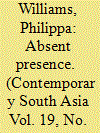

|
|
|
|
|
| Publication |
2011.
|
| Summary/Abstract |
This paper examines the everyday experiences and perspectives of Muslim Ansa-ris (weavers) in urban north India with respect to the 'welfare state'. The case of a recent health insurance scheme, initiated by the Indian government, constitutes the paper's focus. Narratives around the scheme expressed by residents in a majority Muslim mohalla- (neighbourhood) in Varanasi illustrate the ways in which the state's presence was more often experienced through its perceived absence and inaccessibility. But even whilst such experiences represented broader patterns of neglect, locally interpreted as the upshot of being India's largest religious minority, this community was not stricken by a sense of absolute alienation and nor did individual or collective actions exhibit outright disaffection towards the state. More appropriately, 'defensive agencies' informed by degrees of pragmatism, acceptance and resilience, were articulated in an effort to protect, as well as improve the future capacities and ambitions of the neighbourhood residents where the state had seemingly failed. The paper concludes however with a word of caution about celebrating such agency, and reflects on the potential for transformative politics by Muslims in urban India.
|
|
|
|
|
|
|
|
|
|
|
|
|
|
|
|
| 2 |
ID:
178463
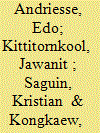

|
|
|
|
|
| Summary/Abstract |
In this article, we compare four fishing-based areas in Thailand and the Philippines to examine if and how small-scale fishing communities are able to escape marginalisation. Three questions guide our inquiry: (i) How have fishing communities been affected by overfishing, climate change and other pressures? (ii) What adaptive strategies have these communities employed to mitigate socio-economic and environmental challenges? (iii) What has been the impact of these strategies on (escaping) marginalisation? Through a survey of 393 fishing-based households and semi-structured interviews with 59 key informants we find an uneven mixture of drivers, strategies and impacts. Respondents varyingly attribute declining fish catch to illegal fishing, overfishing, population increase, climate change and pollution. The case studies illustrate various degrees of adaptive successes that result from integration of top-down and bottom-up initiatives, and availability and access to livelihood strategies. However, the impact of adaptive strategies on overcoming marginalisation remains meagre and constrained by, among others, the power of illegal and commercial fishing and the absence of integrated spatial planning. We call for policy interventions and further research that takes into account the integration of top-down and bottom-up institutions, and the multiple dimensions and spaces of the drivers that shape fisherfolk marginalisation.
|
|
|
|
|
|
|
|
|
|
|
|
|
|
|
|
| 3 |
ID:
161266
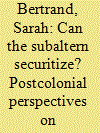

|
|
|
|
|
| Summary/Abstract |
Drawing on postcolonial and feminist writings, this article re-examines securitization theory’s so-called ‘silence-problem’. Securitization theory sets up a definably colonial relationship whereby certain voices cannot be heard, while other voices try to speak for those who are silenced. The article shows that the subaltern cannot securitize, first, because they are structurally excluded from the concept of security through one of three mechanisms: locutionary silencing, illocutionary disablement, or illocutionary frustration. Second, the subaltern cannot securitize because they are always already being securitized and spoken for – as in this case by the well-meaning intellectuals trying to highlight and remediate their predicament. Third, the subaltern cannot securitize because the popular rendering of securitization theory as critical obfuscates and rationalises their marginalisation. This article thus reveals the ‘colonial moment’ in securitization studies, showing how securitization theory is complicit with securitizations ‘for’ that marginalise and silence globally, not just locally outside ‘the West’.
|
|
|
|
|
|
|
|
|
|
|
|
|
|
|
|
| 4 |
ID:
134290
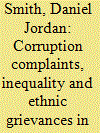

|
|
|
|
|
| Summary/Abstract |
Based on anthropological field work in southeastern Nigeria, this paper explores the public concerns and everyday experience of corruption in a society still living with the legacies of the Biafran secession attempt. The paper shows how the revival of Igbo nationalism and resentment over perceived marginalisation is fuelled by perceptions that the corrupt machinery of the federal government runs against the interests of the Igbo people, and funnels resources away from the southeast as punishment for the failed separatist struggle more than 40 years ago. Hence, complaints about corruption are used to critique the Nigerian state and other regional or ethnic groups, but they also figure in an internally focused critique by Igbos of their own complicity in Nigeria’s endemic corruption.
|
|
|
|
|
|
|
|
|
|
|
|
|
|
|
|
| 5 |
ID:
169995
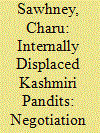

|
|
|
|
|
| Summary/Abstract |
A large-scale displacement of Kashmiri Pandits occurred in 1989–90 when Kashmir came under the control of secessionist groups. The successful resettlement of these refugees was dependent on their access to cultural and social capital. For the migrants from rural areas of Kashmir, resettlement was accompanied by occupational rupture because they had lost their immovable assets such as land and crops. By contrast, Kashmiri migrants from urban areas had greater access to cultural and liquid capital, which enhanced their ability to pick up their lives. This paper demonstrates that access to educational qualifications, and social and cultural capital, had a determining effect in perpetuating class inequalities among Kashmiris in their new locales.
|
|
|
|
|
|
|
|
|
|
|
|
|
|
|
|
| 6 |
ID:
172387
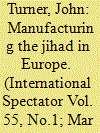

|
|
|
|
|
| Summary/Abstract |
As the Islamic State (IS) caliphate in the Middle East has collapsed, it is seeking to extend its influence elsewhere, particularly in Europe where there are existing inter-communal tensions to exploit. IS has deployed the management of savagery doctrine through acts of terrorism as part of its strategy to increase polarisation by exacerbating fear and distrust among communities, encouraging sympathies for far-right actors among non-Muslims and potentially alienating counterterrorism policies by governments, pushing Muslims out of what it terms the ‘grey zone’. The desired outcome is to drain state resources and showcase Europe as hostile to Muslims, promoting the notion of a ‘war on Islam’.
|
|
|
|
|
|
|
|
|
|
|
|
|
|
|
|
| 7 |
ID:
147649
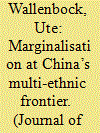

|
|
|
|
|
| Summary/Abstract |
China consists of a mosaic of many territorial ethnic groups whose historic homelands have been incorporated into the modern Chinese state, a process by which the respective populations transformed from a “sovereign or semi-sovereign people” (Bulag 2002: 9) on China’s periphery into “minority nationalities” (少数民族, shaoshu minzu). In 1950 Mao Zedong initiated the “Ethnic Classification Project” whose effect has been the marginalisation of the minority nationalities. In this paper, I explore the marginalisation of the Mongol population of contemporary Henan Mongolian Autonomous County within the Huangnan Tibetan Autonomous Prefecture in southeastern Qinghai Province. By seeking to understand how Henan Mongols deal with their socio-political and demographic marginal status, the aim of this article is to shed light on how they utilise their marginal position, and how they centralise themselves as an independent party interacting with the civilising missions of China and Tibet.
|
|
|
|
|
|
|
|
|
|
|
|
|
|
|
|
| 8 |
ID:
114667
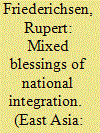

|
|
|
|
|
| Publication |
2012.
|
| Summary/Abstract |
The ethnic minorities of Southeast Asia's uplands, including those of
Vietnam, tend to be portrayed as excluded from national society and locked into
poverty, environmental degradation and positions of subjugation. Recent debates
about Southeast Asian uplands-lowlands relations have questioned this discourse by
highlighting the diversity of experiences, the agency of ethnic minority groups, and
uplanders' strategies of state evasion. This article finds that the integration of the
uplands into the Vietnamese polity should be understood as an ongoing struggle
between nation-building and state expansion characterised by grand visions on the
one hand, and incomplete policy implementation and uplanders' ambiguous stance
towards integration on the other.
|
|
|
|
|
|
|
|
|
|
|
|
|
|
|
|
| 9 |
ID:
131817
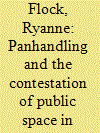

|
|
|
|
|
| Publication |
2014.
|
| Summary/Abstract |
Urban public space is a product of contestations by various actors. This paper focuses on the conflict between local level government and beggars to address the questions: How and why do government actors refuse or allow beggars access to public space? How and why do beggars appropriate public space to receive alms and adapt their strategies? How does this contestation contribute to the trends of urban public space in today's China? Taking the Southern metropolis of Guangzhou as a case study, I argue that beggars contest expulsion from public space through begging performances. Rising barriers of public space require higher investment in these performances, taking even more resources from the panhandling poor. The trends of public order are not unidirectional, however. Beggars navigate between several contextual borders composed by China's religious renaissance; the discourse on deserving, undeserving, and dangerous beggars; and the moral legitimacy of the government versus the imagination of a successful, "modern," and "civilised" city. This conflict shows the everyday production of "spaces of representation" by government actors on the micro level where economic incentives merge with aspirations for political prestige.
|
|
|
|
|
|
|
|
|
|
|
|
|
|
|
|
| 10 |
ID:
173913
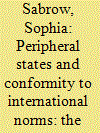

|
|
|
|
|
| Summary/Abstract |
This paper seeks to understand the seemingly paradoxical behaviour of states of the Global South, which on one the hand conform to transnational norms in order to integrate into the international society and on the other hand (sometimes simultaneously) differentiate themselves from them. To that end, this article develops the dilemma of the marginalised in order to show that conformity and differentiation become two paradoxical strategies for marginalised actors to pursue the same goal: equality with powerful states. The transformation of the Organisation of African Unity to the African Union, where significant changes in Africa’s policy vis-à-vis global powers took place, serves as a case study to illustrate how marginalised actors struggle between conformity and differentiation in order to claim their place in the international arena. It also shows how the dilemma of the marginalised can be compelling to help us understand the predicaments of marginalised actors across vastly different situations of structural inequality. Acknowledging the dilemma helps us understand their behaviour rather than to dismiss it as irrational, thereby recognising Third World agency in shaping the international system.
|
|
|
|
|
|
|
|
|
|
|
|
|
|
|
|
| 11 |
ID:
121665
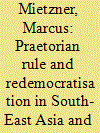

|
|
|
|
|
| Publication |
2013.
|
| Summary/Abstract |
Indonesia is an almost ideal case study to test a variety of explanatory propositions for the rise and fall of military regimes. Over the course of 50 years, Indonesia has witnessed a military takeover, the consolidation of praetorian rule, the toppling of a military-backed autocrat and the marginalisation of the armed forces from politics after democracy took hold. The analysis of these four periods delivers important insights into the conditions under which countries fall victim to military coups and subsequently fail or succeed in their efforts of redemocratisation. While historical, governmental, economic, international and military-internal factors are all at play, it is arguably the quality of civilian governance that has the greatest impact on a state's prospects of preventing military interventionism. In turn, the strength of civilian governments depends to a large extent on the existence of a solid democratic consensus against military rule; as the Indonesian case shows, the absence of such intra-civilian agreements delivers ample opportunities to military officers to meddle in political affairs.
|
|
|
|
|
|
|
|
|
|
|
|
|
|
|
|
| 12 |
ID:
095790
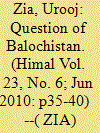

|
|
|
| 13 |
ID:
178458
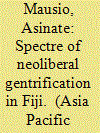

|
|
|
|
|
| Summary/Abstract |
This article seeks to examine Fiji's current housing crisis against the backdrop of neoliberal urbanism. In doing so, the article offers a fresh new perspective on the marginalisation, displacement and outright exclusion of the urban poor from the inner city areas of Suva. Among the trademark growth problems experienced by neoliberal cities across the globe, the crisis of urban housing affordability is perhaps more pronounced in Suva given economies of scale and constraints in Fiji's land tenure system. This article seeks to highlight that Suva's inner city spaces are being transformed along the lines of market fundamentalism and that this will exacerbate the social exclusion and displacement of Suva's poor.
|
|
|
|
|
|
|
|
|
|
|
|
|
|
|
|
| 14 |
ID:
118355
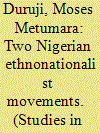

|
|
|
|
|
| Publication |
2012.
|
| Summary/Abstract |
The proliferation of ethnic militia organisations in Nigeria raises questions about the factors responsible for the development. Although reasons adduced from the rhetoric of these organisations point to the politics of exclusion and marginalisation in Nigeria, this form of ethnicity is a new phenomenon. The growth of these militant formations pervading the length and breadth of the country is attributable to the nature and character of the Nigerian state. Perceptions of marginalisation in the distribution of power and resources, and the repressive tactics of the state to sub-national dissent, have encouraged their growth. The Movement for the Actualization of the Sovereign State of Biafra (MASSOB) and the Oodua Peoples Congress (OPC) are prominent ethnic militia groups that draw membership from major ethnic groups in southern Nigeria. Rivalry and hegemonic competition for the control of the state among the major ethnic groups led to a civil war in the late 1960s, but wartime experiences were not harnessed for a nation-building project. The result was the systematic perversion of the state, which has resulted in throwing up new forms of ethnicity in Nigeria as reflected in the emergence of these organisations.
|
|
|
|
|
|
|
|
|
|
|
|
|
|
|
|
| 15 |
ID:
140116
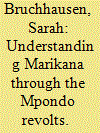

|
|
|
|
|
| Summary/Abstract |
The purpose of this article is to demonstrate some of the ways in which rural histories can enhance our understanding of both rural and urban resistance, both past and present, in contemporary South Africa. In order to do so, it explores two books in conversation with each other, Thembela Kepe and Lungisile Ntsebeza’s edited volume Rural Resistance in South Africa: The Mpondo Revolts after Fifty Years as well as Peter Alexander, Thapelo Lekgowa, Botsang Mmope, Luke Sinwell and Bongani Xezwi’s Marikana: A View from the Mountain and a Case to Answer. These two books provide a useful platform from which to engage in a re-examination of rurally based protest and repression in order to locate some of the suggestive links, particularly in regard to the transmission of repertoires of struggle, between the Marikana strike and the Mpondo revolts, as well as the on-going struggles of the organised poor in some of South Africa’s urban centres.
|
|
|
|
|
|
|
|
|
|
|
|
|
|
|
|
| 16 |
ID:
175058
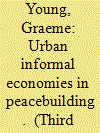

|
|
|
|
|
| Summary/Abstract |
Informal economic activity is often a defining feature of the political economy of conflict and post-conflict cities. Despite its prevalence, however, its implications for peacebuilding remain largely under-theorised. This article draws on the extensive literature on informal economic activity more generally, with a focus on cities, to outline three contrasting perspectives on its significance for peacebuilding: first, that informal economies can support peacebuilding efforts by providing crucial livelihood support and access to essential goods and services in the absence of functioning formal markets; second, that they are a manifestation of resistance to unpopular top-down peacebuilding processes that fail to cohere with local understandings of economic justice; and third, that they can reproduce the conditions that led to conflict by re-establishing socio-economic hierarchies and systems of marginalisation. It argues that each of these perspectives has important implications for the theory and praxis of peacebuilding and raises conceptual challenges that remain unresolved. It then claims that any effort to incorporate urban informal economies into peacebuilding processes must prioritise democratic inclusion, grassroots organisation and formal employment creation if they are to have a meaningful impact on the lives of the urban poor.
|
|
|
|
|
|
|
|
|
|
|
|
|
|
|
|
|
|
|
|
|